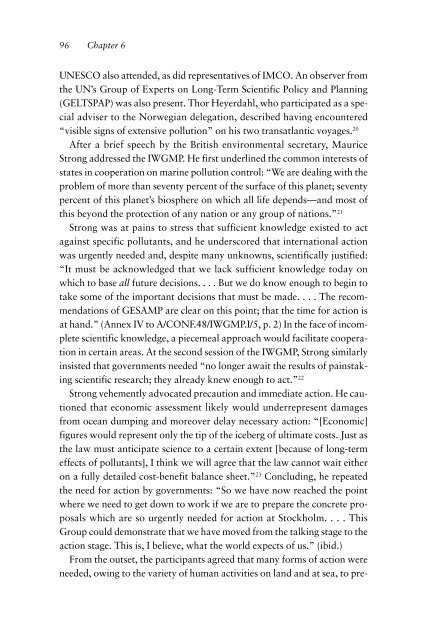Radioactive Waste Disposal at Sea: Public Ideas ... - IMO
Radioactive Waste Disposal at Sea: Public Ideas ... - IMO
Radioactive Waste Disposal at Sea: Public Ideas ... - IMO
Create successful ePaper yourself
Turn your PDF publications into a flip-book with our unique Google optimized e-Paper software.
96 Chapter 6<br />
UNESCO also <strong>at</strong>tended, as did represent<strong>at</strong>ives of IMCO. An observer from<br />
the UN’s Group of Experts on Long-Term Scientific Policy and Planning<br />
(GELTSPAP) was also present. Thor Heyerdahl, who particip<strong>at</strong>ed as a special<br />
adviser to the Norwegian deleg<strong>at</strong>ion, described having encountered<br />
“visible signs of extensive pollution” on his two trans<strong>at</strong>lantic voyages. 20<br />
After a brief speech by the British environmental secretary, Maurice<br />
Strong addressed the IWGMP. He first underlined the common interests of<br />
st<strong>at</strong>es in cooper<strong>at</strong>ion on marine pollution control: “We are dealing with the<br />
problem of more than seventy percent of the surface of this planet; seventy<br />
percent of this planet’s biosphere on which all life depends—and most of<br />
this beyond the protection of any n<strong>at</strong>ion or any group of n<strong>at</strong>ions.” 21<br />
Strong was <strong>at</strong> pains to stress th<strong>at</strong> sufficient knowledge existed to act<br />
against specific pollutants, and he underscored th<strong>at</strong> intern<strong>at</strong>ional action<br />
was urgently needed and, despite many unknowns, scientifically justified:<br />
“It must be acknowledged th<strong>at</strong> we lack sufficient knowledge today on<br />
which to base all future decisions. . . . But we do know enough to begin to<br />
take some of the important decisions th<strong>at</strong> must be made. . . . The recommend<strong>at</strong>ions<br />
of GESAMP are clear on this point; th<strong>at</strong> the time for action is<br />
<strong>at</strong> hand.” (Annex IV to A/CONF.48/IWGMP.I/5, p. 2) In the face of incomplete<br />
scientific knowledge, a piecemeal approach would facilit<strong>at</strong>e cooper<strong>at</strong>ion<br />
in certain areas. At the second session of the IWGMP, Strong similarly<br />
insisted th<strong>at</strong> governments needed “no longer await the results of painstaking<br />
scientific research; they already knew enough to act.” 22<br />
Strong vehemently advoc<strong>at</strong>ed precaution and immedi<strong>at</strong>e action. He cautioned<br />
th<strong>at</strong> economic assessment likely would underrepresent damages<br />
from ocean dumping and moreover delay necessary action: “[Economic]<br />
figures would represent only the tip of the iceberg of ultim<strong>at</strong>e costs. Just as<br />
the law must anticip<strong>at</strong>e science to a certain extent [because of long-term<br />
effects of pollutants], I think we will agree th<strong>at</strong> the law cannot wait either<br />
on a fully detailed cost-benefit balance sheet.” 23 Concluding, he repe<strong>at</strong>ed<br />
the need for action by governments: “So we have now reached the point<br />
where we need to get down to work if we are to prepare the concrete proposals<br />
which are so urgently needed for action <strong>at</strong> Stockholm. . . . This<br />
Group could demonstr<strong>at</strong>e th<strong>at</strong> we have moved from the talking stage to the<br />
action stage. This is, I believe, wh<strong>at</strong> the world expects of us.” (ibid.)<br />
From the outset, the participants agreed th<strong>at</strong> many forms of action were<br />
needed, owing to the variety of human activities on land and <strong>at</strong> sea, to pre-

















